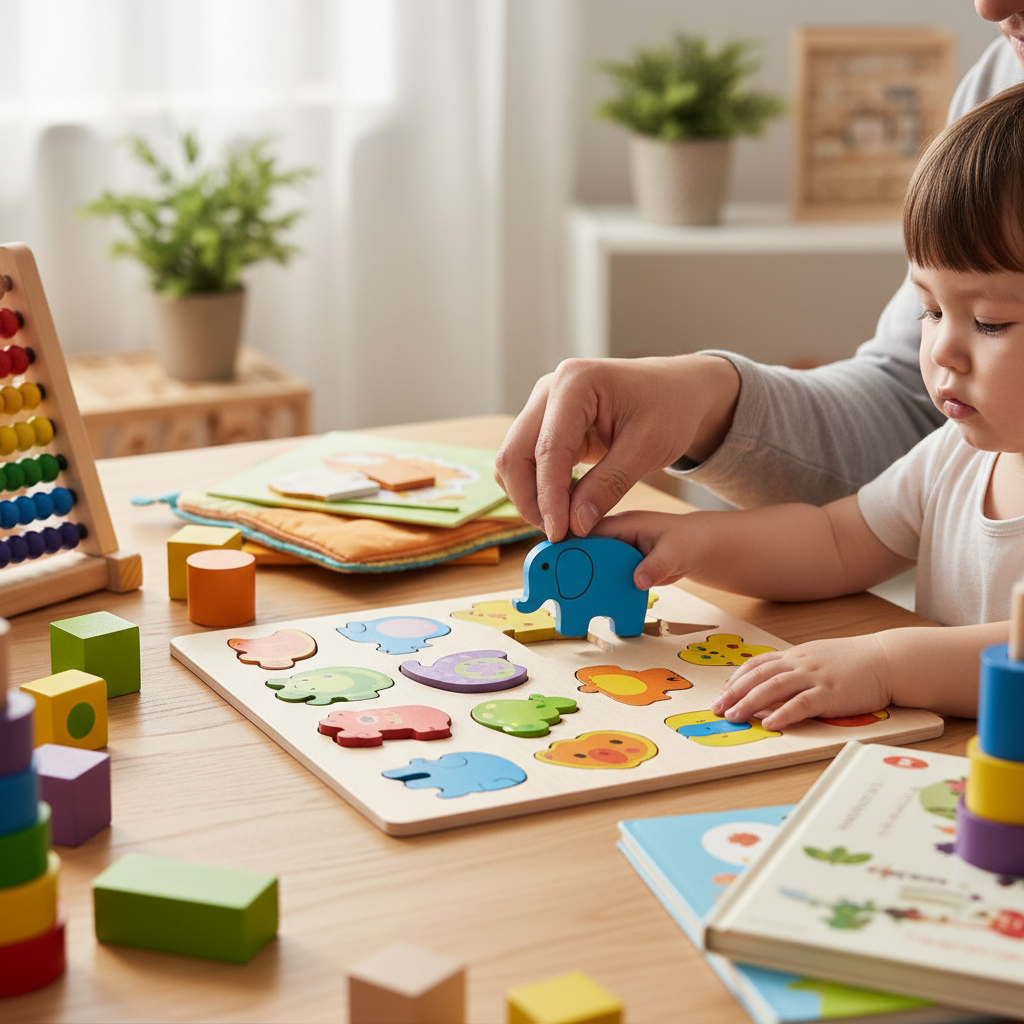
Table of Contents
Introduction
Let’s be honest about parenting—it’s incredible and exhausting, often in the same five-minute span. You want to do right by your kids, but sometimes it feels like you’re flying blind. One expert says this, another says that, and your mom has her own opinions (doesn’t she always?). Where do you even start when there’s so much conflicting advice out there?
Here’s the thing about child development: every kid hits their milestones differently. Your neighbor’s toddler might be speaking in full sentences while yours is still perfecting the art of throwing food across the room. And that’s okay. When you understand what’s actually normal for each stage, you stop second-guessing yourself so much. If you’re just starting this whole parenting adventure, checking out parenting advice for new parents can give you that solid foundation you’re looking for. Many parents also swear by positive parenting techniques that build real trust between you and your child—the kind that actually makes discipline easier down the road.
But here’s what nobody tells you: taking care of yourself isn’t selfish. It’s necessary. New dads especially need to hear this—stepping into fatherhood can feel overwhelming, and that’s completely normal. The essential tips for first-time dads can help you feel more confident in your new role. And if you’re doing this solo? You’re not alone, even when it feels like it. Single parent support groups offer real community—people who get it when you say you’re tired but don’t want to complain. Taking the parenting styles quiz might also surprise you with insights about your natural approach to raising kids.
And then there are teenagers. (Deep breath.) Just when you think you’ve figured out parenting, they become these fascinating, frustrating almost-adults who need you differently than before. The key is finding ways to stay connected while respecting their growing independence—easier said than done, right? We’ll talk about effective strategies to motivate teenagers that actually work (without the eye rolls). If you’re looking for hands-on help, parenting workshops near you can connect you with other parents and give you practical tools you can use right away.
What You’ll Learn in This Guide
This guide covers the stuff that actually matters—the real challenges and practical solutions that make family life smoother. Whether you’re dealing with a cranky newborn or a moody teenager, you’ll find advice that works in the real world.
- Understanding Developmental Stages: Learn about the physical, emotional, and cognitive milestones that your child will experience and how to nurture their growth effectively at each stage.
- Effective Communication Techniques: Discover strategies such as active listening and positive reinforcement to build a strong, open relationship with your child and encourage mutual respect.
- Discipline and Boundaries: Explore best practices for consistent and fair discipline, establishing routines, and setting healthy boundaries that teach responsibility and self-control.
- Balancing Parenthood and Self-Care: Find guidance on managing your own well-being alongside parenting duties, including stress management and time organization to maintain a fulfilling family life.
What you’ll find in the coming sections isn’t just theory—it’s practical wisdom that strengthens the bonds within your family. We’re talking about mindful parenting that prioritizes understanding over perfection. Because here’s what I’ve learned: when you approach parenting with empathy and consistency, you build the kind of trust that makes everything else easier. Speaking of building that foundation, don’t overlook the importance of finding the right healthcare support. Our guide on how to choose a pediatrician will help you find someone who truly partners with you in your child’s health and development.
You’ll find thoughtful advice here, but more importantly, you’ll find practical tools that work. Whether you’re figuring out sleep schedules with a newborn or navigating the social drama of middle school, this guide meets you where you are. No judgment, no impossible standards—just real support for the beautiful, messy reality of raising kids. These strategies will help you parent with confidence, knowing you’re building an environment where your family can truly thrive.
Parenting changes you in ways you never expected. This guide will be your steady companion through all of it—the late-night worries, the proud moments, the times when you wonder if you’re doing anything right. We’ll explore methods that actually work, backed by research but grounded in real-life experience. The kind of advice that helps you celebrate the victories and handle the challenges with more grace than you thought possible. Ready to dig in? Let’s start building the parenting approach that fits your family perfectly.

Parenting? It’s honestly one of the most incredible—and exhausting—adventures you’ll ever take on. Sure, it’s rewarding, but let’s be real: it’s also complicated as heck. Kids don’t come with instruction manuals (wouldn’t that be nice?), and just when you think you’ve got things figured out, they grow and change everything on you again. Whether you’re holding your first baby or trying to decode your teenager’s latest mood swing, the good news is this: there are proven strategies that actually work. We’re talking about building real connections, handling discipline without losing your mind, and—here’s the kicker—taking care of yourself in the process.
Understanding and Supporting Your Child’s Development
Here’s what I’ve learned about child development: it’s not just about hitting milestones on schedule. It’s about really getting to know your kid—how they think, what makes them tick, and what they need from you right now. Every age brings something new to the table. Your chatty four-year-old isn’t the same person they were as a quiet two-year-old, and they definitely won’t be the same as a moody fourteen-year-old. The trick is staying tuned in and adjusting your approach as they grow. Want to give them the best start possible? Check out the importance of early childhood education—it’s eye-opening stuff about how those early years really set the stage for everything that comes after. And speaking of staying involved, how positive parental involvement in education can make a massive difference in how your child experiences school and learning.
Think of development like a three-legged stool—emotional, physical, and cognitive growth all need attention or the whole thing gets wobbly. When your kid comes home upset about something that happened at school, that’s your cue to validate those feelings (even if the problem seems small to you). Their emotions are real and big in their world. On the physical side, yeah, nutrition matters, but so does letting them run around and burn off energy. As for their brain? Keep it curious. Read together, ask “what if” questions, let them figure things out. The beautiful thing is how all these pieces work together—a confident kid who feels heard is more likely to try new things and bounce back when stuff gets tough.
Key Aspects of Child Development Support
Want to know where to focus your energy? Here are the big ones that really move the needle:
- Emotional Development: Your child’s feelings are valid, period. Help them put words to what they’re experiencing, and teach them healthy ways to express those big emotions. This isn’t just about managing tantrums—you’re building their emotional toolkit for life.
- Physical Growth Encouragement: Good food and movement aren’t punishments—they’re fuel for adventure. Create routines around meals and play that feel natural, not forced. A well-fed, active kid is generally a happier, more focused kid.
- Cognitive Stimulation: Challenge their minds in ways that feel like play. Puzzles, stories, building blocks, nature walks—anything that gets them thinking and wondering. Match the activity to where they are developmentally, not where you think they should be.
- Parental Engagement in Education: Stay connected with what’s happening at school. I’m not saying hover, but be genuinely interested. Ask about their day, know their teacher’s name, and show up when it matters. Your involvement tells them their education matters to you.
When you nail these areas, something magical happens. Your home becomes a place where kids feel safe to grow, make mistakes, and try again. Transitions get easier (though never perfect—let’s be honest). And your relationship? It gets stronger because it’s built on understanding and respect. Which brings us to the next piece of the puzzle: how you actually talk to each other.
Effective Communication and Positive Parenting Techniques
Communication with kids isn’t the same as communication with adults—and that’s actually a good thing. Kids haven’t learned to filter everything through politeness and social expectations yet. They’ll tell you exactly what they think, often at the worst possible moment. Your job isn’t to shut that down but to guide it in a direction that works for everyone. Good communication starts with respect—both ways. They listen better when they feel heard, and they’re more likely to come to you with problems when they trust you won’t judge or dismiss them. Ready to level up your parenting game? These positive parenting techniques are game-changers for building relationships that actually last. And if you’re just starting this whole parenting adventure, this parenting advice for new parents will help you navigate those early days without completely losing your sanity.
Active listening sounds simple, but it’s harder than you think. When your kid is telling you about their day, are you really listening or are you mentally planning dinner? Put down the phone. Make eye contact. Reflect back what they’re saying: “So you felt left out when they didn’t include you in the game.” That’s it—you’re not fixing it, just acknowledging it. Praise works too, but make it specific. Instead of “good job,” try “I noticed how patient you were with your little sister when she was having a hard time.” See the difference? One tells them they did something right, the other tells them exactly what they did right and why it mattered.
Key Aspects of Effective Communication and Discipline
These techniques work because they respect your child’s developing brain while still maintaining your role as the adult in charge:
- Active Listening Techniques: Stop multitasking when they’re talking to you. Look at them, nod, ask follow-up questions. When they feel truly heard, they’re more likely to keep talking to you as they get older—and trust me, you want that.
- Positive Reinforcement: Catch them doing things right and name it specifically. “You remembered to put your plate in the dishwasher without being asked” works better than a generic “thanks.” You’re training their brain to notice their own good choices.
- Consistent, Fair Discipline: Natural consequences teach better than punishments. Forgot their homework? They deal with the teacher, not a lecture from you. Clear boundaries give kids security, even when they push against them.
- Establishing Predictable Routines: Kids thrive on knowing what comes next. Bedtime routines, morning routines, even “how we handle disagreements” routines—predictability reduces anxiety for everyone and makes the tough moments more manageable.

Let’s be real—parenting is messy, beautiful, and nothing like what you expected. One minute you’re celebrating your toddler’s first words, the next you’re wondering why they’re having a meltdown over the wrong color cup. But here’s what we’ve discovered together in this guide: understanding your child’s emotional, physical, and cognitive milestones isn’t just helpful—it’s your secret weapon. When you tune into what makes your kid tick, everything else starts falling into place. Good communication? It’s built on actually listening (not just waiting for your turn to talk) and catching them being good. Those boundaries and routines everyone talks about? They’re not about control—they’re about creating a safe space where your child knows what to expect. And that whole self-care thing? Not selfish. Essential.
Being a confident parent means rolling with the punches. You’ll face everything from sleepless newborn nights to teenage eye rolls that could power a small city. The key is developing patience (easier said than done, right?), empathy, and the ability to adapt when your carefully laid plans go sideways. Because they will. Here’s something important: knowing when to ask for help isn’t admitting defeat—it’s being smart. Whether that’s reaching out to your pediatrician, joining a parent group, or just calling your mom at 2 AM, support systems matter. When you approach parenting as something you’re always learning (because surprise—kids don’t come with instruction manuals), you create the kind of home where your child feels secure enough to be themselves.
Ready to take some concrete steps? Start with the basics. If you’re just beginning this adventure, check out essential parenting advice for new parents—it’ll help you nail down those early routines and build confidence when everything feels overwhelming. Want to strengthen your connection with your kids? Dive into positive parenting techniques that actually work for building respect and cooperation (without the power struggles). Looking for real-world support? Find parenting workshops near you where you can learn from experts and connect with other parents who get it. And because parenting can be incredibly stressful, mastering some stress management techniques will keep you sane and energized for the long haul.
Here’s the truth: perfect parents don’t exist. (If you meet one, they’re probably lying.) What matters is showing up with love, staying curious about your child, and being willing to grow alongside them. You’re going to make mistakes—we all do. Your kids will survive eating cereal for dinner occasionally, and they won’t be traumatized if you lose your cool sometimes. What they’ll remember is feeling loved, heard, and safe in your home. Trust yourself more than you think you should. You know your child better than anyone. When you need help, ask for it. And don’t forget to celebrate the small wins—they’re everywhere if you look for them. This parenting thing? You’ve got this.
Frequently Asked Questions
-
What is the most important advice for new parents?
- Focus on understanding your child’s needs and building a strong emotional connection. Establish routines that foster safety and comfort for both you and your baby.
-
How can I improve communication with my child?
- Practice active listening by giving your full attention and validating their feelings. Use specific positive reinforcement to encourage desired behaviors and strengthen trust.
-
When should I consider professional help for my child?
- If you notice persistent developmental delays, behavioral challenges, or family dynamics that are difficult to manage, seeking expert advice can provide valuable support and guidance.
-
What are effective discipline techniques?
- Use consistent, fair methods such as natural consequences, clear boundaries, and predictable routines. These approaches teach responsibility and help your child develop self-control.


